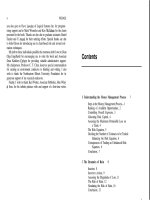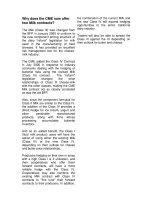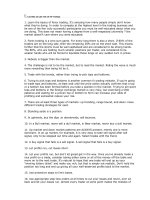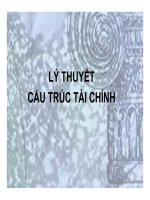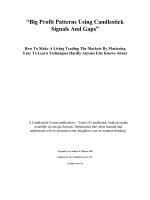Fx traders edge candlestick pattern primer
Bạn đang xem bản rút gọn của tài liệu. Xem và tải ngay bản đầy đủ của tài liệu tại đây (787.94 KB, 21 trang )
Candlestick Patterns
Analysis Toolbox
www.pristine.com
Reversal Chart Patterns
Disclaimer
The candlestick patterns explained in this
presentation are for information purposes only.
Candlestick patterns are used to supplement your
chart analysis and are not meant to be used on their
own without other confirmations.
FX Traders EDGE cannot be held responsible for any
consequences that may result from the use of these
candlestick patterns or any other information in this
presentation. This presentation is for Educational
Purposes only.
2
Reversal Chart Patterns
Notes
We learned that there are two types of patterns: Continuation and Reversal. Reversal
patterns occur at the end of a trend. Continuation patterns occur during the trend and are
merely pauses or consolidations in the trend.
Several things occur at market reversal points: At market tops, traders are greedy and at
market bottoms, traders and investors are fearful – both sentiments lead to market
extremes, even in currencies!
At either extreme, there is a major trend line break – so plot those trend lines! Also, price
tends to deviate from the moving averages so look for the rubber band effect! Certain
candlestick patterns emerge at the end of the trend – this is where you tend to see long
wicks and patterns such as bullish and bearish engulfing, morning and evening stars,
hammers, shooting stars, and tweezer tops and bottoms.
Finally, the longer the pattern takes to materialize, and the larger the pattern, the further
the prices will move outside of that pattern, and the greater its importance. That doesn’t
mean that these patterns aren’t found on shorter time frames – they are, but they need to
be traded nimbly with definitive profit objectives and stop losses.
3
Reversal Chart Patterns
Markets are fractal, meaning that chart
patterns form repeating arrangements or
shapes in any time frame.
Reversal Chart Patterns
Classical technical analysis books defined chart
patterns in the 70’s that are still true today.
Correctly identify these patterns to determine
future trading opportunities.
Reversal chart pattern recognition helps
determine change in market sentiment and
time entries and exits.
All chart patterns have measured objectives.
4
Reversal Candlestick Patterns
Reversal Days are also called Top or Bottom
Reversal Days, Buying or Selling Climaxes, and
Key Reversal Days. Learning how to trade them
can get you into a trend reversal early.
Reversal Candles
Two Day Reversals are also quite common, as
sometimes it takes two days for the market to
reverse itself.
Topping and bottoming fractals are 3-day
formations found at the top and bottom of
markets and can get you into the new trend
early.
5
Reversal Candlestick Patterns
Reversal Candles – Reversal Days
Reversal Days are also called Top or Bottom Reversal Days, Buying or Selling Climaxes, and
Key Reversal Days. Learning how to trade them can get you into a trend reversal early.
S
In the case of a market top, a new high forms that period, but
price closes in the bottom 25% of that period’s trading range.
The longer the wick, the more powerful the move will be in
the opposite direction.
In the case of a market bottom, a new low forms that period,
but price closes in the top 25% of that period’s trading range.
B
Trade entry: For a market top, place a sell stop order below the low of the reversal
day. For a market bottom, place a buy stop order above the high of the reversal day.
Place the stop just above the high of the top or below the low of the bottom.
6
Reversal Candlestick Patterns
Reversal Candles – Topping and Bottoming Fractals
Topping and bottoming fractals are 3-candle formations found at the top and bottom of
markets and can get you into the new trend early.
S
B
In the case of a market top, the fractal high (candle 2) is
higher than the high of the previous candle (candle 1) and the
high of the subsequent candle. (candle 3)
In the case of a market bottom, the fractal low is lower than
the low of the previous candle and the low of the subsequent
candle.
Trade entry: For a market top, place a sell stop order below the low of candle 3. The
stop is above the candle 2 or 3 highs, preferably above the candle 2. For a market
bottom, place a buy stop order above the high of candle 3. The stop is below the
candle 2 or 3 lows, preferably below the candle 2.
7
Reversal Candlestick Patterns
The Japanese have used candlesticks as a
charting and analysis technique for centuries.
Candlestick Patterns
Candlesticks mostly help pick tops and bottoms
and are most powerful when they confirm a
western indicator.
Candlestick patterns are psychological imprints
of what traders are thinking at any given time.
There are approximately 40 reversal candle
patterns that vary from single candlesticks to
groupings of up to five candlesticks.
8
Reversal Candlestick Patterns
Real Body
Real Body
9
Understanding Candlesticks
"A" – wide range body with no tails or shadows –
very bullish or bearish for a trend move
"B" - opening and closing prices are practically
identical – no real control – a pause
"C" shows a very small trading range with a narrowrange body – a pause with no major follow-thru
"D" shows the opening and closing near the high
with a long bottoming tail or shadow
"E" shows the opening and closing near the low with
a long topping tail or shadow
10
10
Understanding Candlesticks
Which is ‘most’ bullish or bearish of these candles?
You might say that “A” is the most bullish or bearish candle. And it is very bullish or bearish
in a strong up- or down-trend. But in some cases, “D” on the left can be more bullish and
“E” on the right can be more bearish.
In the case of “D”, a battle was fought, and at one point, the shorts were in control. By the
end of the bar, the longs fought all the way back and actually brought the currency pair
above the opening price. This candle, if located at the bottom of a down-trend, can
potentially signal a reversal in the trend. The same is true for the sellers in “E” on the right.
11
Reversal Candlestick Patterns
Bullish and Bearish Patterns
Bullish Patterns Bearish Patterns
Candlestick Patterns:
Illustrated Examples
that are opposites of
each other
Bullish Engulfing
Morning Star
Hammer
Inverted Hammer
Piercing Pattern
Tweezer Bottom
Bearish Engulfing
Evening Star
Hanging Man
Shooting Star
Dark Cloud Cover
Tweezer Top
Dojis – Candles of Indecision
Perfect, Long-legged, Dragonfly, Gravestone
12
Reversal Candlestick Patterns
Bullish and Bearish Patterns
Bullish and Bearish Patterns
Bullish Engulfing Pattern
Market is in a definable downtrend.
Candle 1 has a small red real body.
Candle 2 reverses where the green body completely
engulfs the previous day’s red body.
A stronger signal occurs when the green reversal
candle body engulfs two or more bodies.
13
Reversal Candlestick Patterns
Bullish and Bearish Patterns
Bearish Engulfing Pattern
Market is in a definable uptrend.
Candle 1 has a small green body in an uptrend.
Candle 2 reverses where the red body completely
engulfs the previous day’s green body.
A stronger signal occurs when the red reversal
candle body engulfs two or more bodies.
14
Reversal Candlestick Patterns
Bullish and Bearish Patterns
Bullish Morning Star Pattern
Bullish three-candle pattern at swing lows.
Candle 1 has a tall red real body.
Candle 2 has a small red or green body.
Candle 3 closes at least 50% into the first real body
and is a tall green candle.
15
Reversal Candlestick Patterns
Bullish and Bearish Patterns
Bullish and Bearish Patterns
Bearish Evening Star Pattern
Candlestick Pattern:
Evening Star
Bearish three-candle pattern at swing highs.
Candle 1 has a tall green real body.
Candle 2 has a small green or red real body.
Candle 3 closes at least 50% into the first real body
and is a tall red candle.
16
Reversal Candlestick Patterns
Bullish and Bearish Patterns
Bullish Hammer
Bullish Hammer
Small real bodies (either green or red).
Real bodies are near high of the session with very
long lower shadows (at least 2-3 times the height of
the real body).
Bearish Hanging Man
A hammer appears at the bottom of the decline
(market hammering out a base). It is bullish.
Bearish Hanging Man
Hanging man appears after an uptrend. It is bearish.
17
Reversal Candlestick Patterns
Bullish and Bearish Patterns
Bullish and Bearish Patterns
Inverted Hammer
Bullish Inverted Hammer
Candlestick Pattern:
Shooting Star
Shooting Star
The Inverted Hammer is a bottom reversal candle,
and the following day is a strong bullish day, that
confirms the reversal signal.
Bearish Shooting Star
The Shooting Star is a top reversal candle, just like
the hanging man. However, it displays a long upper
shadow, and its small real body is at or near the lows
of the session.
The Japanese say that the shooting star shows
“trouble overhead”. Because of the bearish long
upper shadow, we don’t need as much bearish
confirmation as we do with a hanging man.
18
Reversal Candlestick Patterns
Bullish and Bearish Patterns
Piercing Line
Bullish Piercing Line
(not 24 hour Forex)
Candlestick Pattern:
Shooting Star
Dark Cloud Cover
(not 24 hour Forex)
The body of the first candle is red where the sellers
are in control and the body of the second candle is
green. In non-Forex markets, the 2nd candle gaps
down to open lower than the previous candle close,
and ends up closing more than half-way through the
first candlestick. In Forex markets, the candle opens
at the close of the previous candle, trades lower and
ends up closing more than 50% higher.
Bearish Dark Cloud Cover
The 2nd candle gaps open above the 1st candle close
and ends up closing at least 50% into the body of the
1st candle. In 24 hour Forex markets there are no
gaps so this pattern looks different in Forex.
19
Reversal Candlestick Patterns
Bullish and Bearish Patterns
Tweezer Bottom
Bullish Tweezer Bottom
Candlestick Pattern:
Any two candles qualify as Tweezer Bottoms
providing they have the same price low and are
situated in a downward price trend. The twin low
price signals support for the market traded.
Shooting Star
Tweezer Top
Bearish Tweezer Top
Any two candles qualify as Tweezer Tops providing
they have the same price high and are situated in an
upward price trend. The twin high price signals
overhead resistance for the market traded.
20
Reversal Candlestick Patterns
Bullish and Bearish Patterns
Bullish and Bearish Patterns
Candlestick
Patterns:
Candlestick
Patterns
Patterns
Indecision
Patterns
of of
Indecision:
Dojis
Dojis
Characterized by equal open and close prices.
When the Doji appears at a major trend line,
channel line, key support and resistance, it is an
indication of a potential reversal.
21



